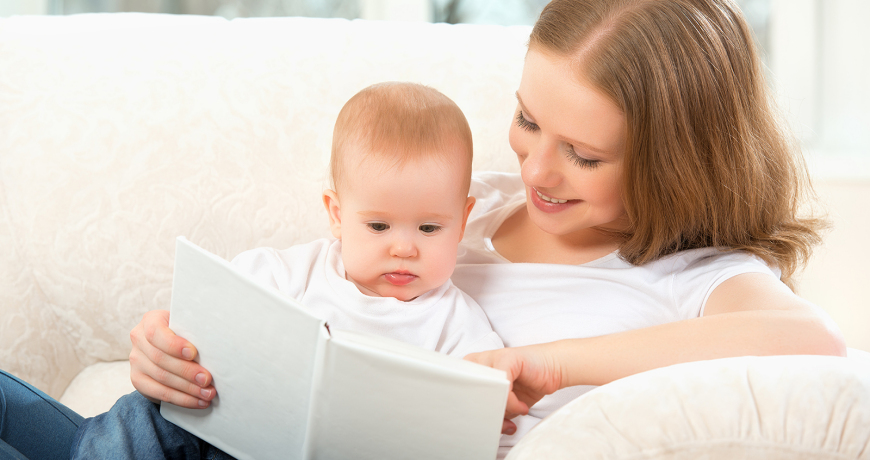Book Play and Early Literacy
In my first blog (July 2013) I wrote about the importance of babies having a variety of books available to play with and explore so that they can discover the Bookness of Books.
We know that a Treasure Basket (Anita Hughes 2006) is a focussed general learning experience for a baby. Giving babies a variety of books of different sizes, shapes weights and materials piled on the floor or placed in a Treasure Basket not only gives that child the opportunity to play with books but also enhances their early general learning and knowledge of their physical world.
An 8 month baby will handle books, mouth, smell, lift, squish and drop books as if they were interesting objects. They will focus their whole bodies in this exploration and take great pleasure in the sensory feedback of repeated movements. Babies will return to certain parts of books that catch their interest, sometimes the colours; sometimes the hole to poke their finger through (great for practicing the use of the vital pointing finger); sometimes a furry body to feel. Babies learn to pile with books, bang with books, move them, turn them upside down, turn the pages. Later, toddlers can turn the books into imaginative play objects in order to build chairs, houses, beds and play with hats (see my book Books Always Everywhere).
Given the opportunity, this sort of non social play with books or indeed other interesting objects, is what babies normally do on their own. Adults are usually around checking that their baby is safe, but babies do not need their parents to show them anything.
Early Story Telling
Recently (October 2014) I gave my annual seminar to the Master’s Early Literacy course at the University of Glasgow, Department of Education. Each year I show video clips and stills of babies playing with books and we discuss how this play adds to the general learning of the babies and the more specific understanding of the Bookness of Books. This year I brought a new clip showing 8 month old Emily playing with books. She grabs books from the floor and rolls over on to her back using her whole body and all her senses to explore them, mouthing, touching the shiny colours, smelling the books, lifting, dropping them.
A later clip shows Emily at 12 months sitting up and touching the picture on the page with her finger, moving the book around and turning and returning pages. Whilst she is doing this she is singing. There is a continuous rise and fall of a vocalisation which goes with the physical exploration.
In the seminar I noted this as a development from Emily’s earlier sensory exploration: Instead of putting the book into her mouth, she is learning that sounds coming from her mouth are somehow connected with books. My colleague, running the course, developed this further by saying that it was as if Emily was telling her own story. Language is now part of her early literacy experience.
Early Reciprocal Book Play
After the seminar I looked at another clip of Emily sitting on her mother’s lap at 12 months (not shown in the seminar). Emily is interacting with the book. She is pointing to the pictures and turning the pages and clearly labelling one or two objects. Mum points too and repeats back to Emily. Then Mum starts to read the text but Emily interrupts, pointing. Mum stops reading and follows her daughter’s play for a moment or two. Then mum says laughingly to Emily “don’t you want me to read the words to you?” She pauses for a response. Emily is quiet and looking at the book. Mum starts to read again.
A few moments later Emily slithers to the floor with the book and moves away. Emily may not be able to say “stop mum” but has her own ideas and communicates these clearly.
It will come as no surprise to learn that Emily has been read to by her parents all her life. She loves to cuddle and listen to a story and now brings her choice of book to share with her parents but in this video clip she has something else in mind. Perhaps she wants to be quiet with the book or lead her own book play.
Sharing Books
So along the way babies learn that parents like to ‘play’ with their (baby’s) books too. They want to sit with their babies on their lap and play together. Grown ups want to point and to readjust how the book is held or how the pages should be turned; they like to talk and sing whilst holding the book even though their baby may have different ideas. This book sharing seems to happen all over the place: in bed, on the sofa, in the garden, car, bath or library. Lots of different grown-ups and even brothers and sisters seem to like to do this stuff with them.
And this is OK as it is helping the baby understand other aspects of early book play: that books can be shared with grownups and can be a social event. Not only can cuddling be pleasurable but it is great fun making up stories together to go with the pictures. Grown ups can also be brilliant at making up stories on their own!
For babies, learning about the Bookness of Books, telling stories, playing with language, communicating and sharing and making choices are all aspects of early literacy. And this is only the beginning.
References
‘Babies and the Bookness of Books’ July 2013 in www.janeblattatwork.com
Treasure Basket: Anita Hughes 2006, David Fulton Publishers
Books Always Everywhere (Jane Blatt illustrated by Sarah Massini, Nosy Crow 2013)

